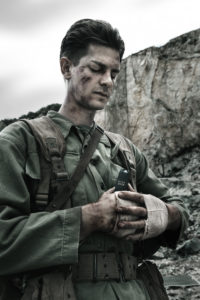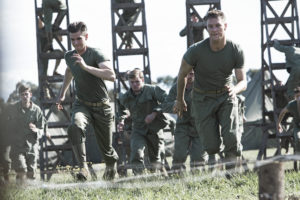Mel Gibson on bringing to life the true wartime account of Desmond Doss: “I was astounded by the extent of his sacrifice.”
At the 2017 Academy Awards, one of the nominees vying for multiple awards—including Best Picture—was a story of a man whose religious principles led him to become the first conscientious objector awarded the Congressional Medal of Honor.
Hacksaw Ridge, now available on home video, is directed by Mel Gibson. The film stars Andrew Garfield as Desmond Doss, a Christian war medic during World War II who refused to carry a weapon on the battlefield–yet saved 75 men on the front lines.
The result is a brutal look at war—the film is rated R for intense prolonged realistically graphic sequences of war violence including grisly bloody images. But Hacksaw Ridge is also the remarkable true story of a man who courageously stood up for his principles and still saved the lives of so many of his fellow soldiers.
“Desmond Doss was singular,” notes Gibson. “There are few, if any people, who could or would replicate his actions. The humility he maintained in discussing his heroics is a testament to the mettle of the man. In fact, Desmond was asked permission for years to adapt his story into a film, and repeatedly declined, insisting that the “real heroes” were the ones in the ground. In a cinematic landscape overrun with fictional ‘superheroes,’ I thought it was time to celebrate a real one.”
RELATED: Producer: Oscar noms for ‘Hacksaw Ridge’ shows Hollywood should do more faith-based films
A MAN ON A MISSION
 A Seventh Day Adventist, Desmond Doss was living in Virginia when he voluntarily enlisted in the U.S. Army. He had no interest in fighting, but rather Doss wanted to serve as a “non- combatant” medic.
A Seventh Day Adventist, Desmond Doss was living in Virginia when he voluntarily enlisted in the U.S. Army. He had no interest in fighting, but rather Doss wanted to serve as a “non- combatant” medic.
It wasn’t a path with which the military was familiar, but Doss persisted. Skinny, vegetarian and unwilling to train on Saturdays let alone carry a gun, Doss was initially ridiculed and abused by his compatriots–who, convinced he would be a dangerous liability, tried every which way they could to drive him out of the army.
But Doss persisted all the way to Okinawa, where his unit was ordered to take part in the near-impossible capture of the massive Maeda Escarpment–a.k.a. Hacksaw Ridge. Atop this steep, looming 400-foot cliff lay heavily fortified machine-gun nests, booby traps and Japanese soldiers in caves who vowed to fight to the end.
Facing heavy fire, the battalion was ordered to retreat. Doss alone remained behind and ran repeatedly into the kill zone, with nothing but his convictions, to drag to safety an estimated 75 badly injured men who were destined to die had he not intervened.
Doss would go on to receive the Medal of Honor from President Harry Truman in October of 1945, with a citation that drew attention to “outstanding bravery and unflinching determination in the face of desperately dangerous conditions.”
THE JOURNEY TO THE SILVER SCREEN
In the years after those events, those who became aware of what Doss achieved immediately saw that that it was a potent and provocative story.
But it would take a half century before it could make its way to the silver screen–in part because Doss chose to lead a quiet, humble life without the notoriety a film would bring.
“Desmond didn’t want to popularize himself, feeling that that would be a contradiction to who he was,” explains one of the Hacksaw Ridge producers, Bill Mechanic. “It wasn’t until late in his life that people convinced him that it was time to tell the story so that it would live on.”
Eventually, documentary filmmaker Terry Benedict received permission to produce a documentary about Doss, who passed away March 2006 at the age of 87.
Benedict created the documentary The Conscientious Objector. Feeling the time was also right to bring Doss’s story to motion picture audiences as a drama, Benedict began working with producers David Permut and Bill Mechanic.
“For the most part, Desmond has been a forgotten hero by the general public,” notes Permut. “I’m very proud that we had the opportunity to immortalize his legend in a film that presents a truly unique perspective of war, conviction and a man who stands by his beliefs at all costs.”
“I always saw this story as being about a man who has very strong beliefs,” Mechanic says, “which are then tested in an absolute hell that he comes out of even stronger.”
FAITH AND COURAGE IN THE FACE OF WAR
 Combining elements of romance, family struggles, probing of faith and the brutal realities of war, Doss’s journey certainly wasn’t a story that lent itself to a conventional film structure. The screenwriters combined Doss’s own verbal accounts with Army records to explore how Doss’s steadfast belief that it was wrong to kill–even in a war he believed was justified–emerged.
Combining elements of romance, family struggles, probing of faith and the brutal realities of war, Doss’s journey certainly wasn’t a story that lent itself to a conventional film structure. The screenwriters combined Doss’s own verbal accounts with Army records to explore how Doss’s steadfast belief that it was wrong to kill–even in a war he believed was justified–emerged.
“You have to understand where Desmond comes from to understand the decisions he makes,” Mechanic explains. “We discussed at one point starting in Okinawa, but it was just too important to explain the impact of Doss’s parents, of his meeting his wife Dorothy, and the formation of his rudimentary belief system as a young man.”
ENTER MEL GIBSON
With a screenplay that balanced elements of faith and home with the violent reality of war, the producers knew that Mel Gibson was the best choice to tap as the project’s director.
With a stack of acclaimed films that includes Best Picture-winner Braveheart, The Patriot, We Were Soldiers, The Passion of the Christ, and Apocalypto, Gibson is lauded for meshing big themes with atmospheric style that takes audiences into revealing worlds.
“Hacksaw Ridge felt to me almost like a companion piece to Braveheart,” comments Mechanic. “It pulls together the same themes of faith, violence and war.”
Gibson saw in Hacksaw Ridge a chance to bring into the light a forgotten hero – and he was drawn to Desmond Doss as man who determined to find a way to live by the values that meant everything to him, even when they seemed in conflict with the whole world around him.
“When I heard the story of Desmond Doss, I was astounded by the extent of his sacrifice. When WWII broke out and young men raced to enlist, Desmond faced a predicament – he was as eager to serve as any man, but violence conflicted with his religious and moral beliefs. He refused to even touch a weapon.
“How does somebody go into the worst place on earth without a weapon? It was all the more compelling to me, because it was a true story, and I thought I could bring my visual language to it.”
NOT AN OBJECTOR, BUT A CO-OPERATOR
Gibson notes that Doss never called himself a conscientious objector. That was the army’s term. Instead, he called himself a “conscientious co-operator,” believing with unflagging tenacity that he had plenty to contribute without having to kill other human beings.
“He was a co-operator in the sense that he passionately wanted to join the war effort, but he wanted to enter it as someone aiming not to take life but to save it,” says Gibson. “Still, you have to ask, what kind of madman goes into that kind of a conflagration seen on Okinawa without being armed? Doss defied what anyone could have expected from that situation.
“Somebody mentioned to me that the Congressional Medal of Honor is usually given to people who have a singular moment where they make a snap decision and do one heroic thing. One of the things that stood out to me about Desmond is that in Okinawa, this guy was heroic 24/7, for a whole month. He took heroism to another level not often seen.”
When it came to the battle sequences, Gibson zeroed right in on the most essential and creative details. Yet even in the most frenetic action, Gibson wanted the humanity of the character to hold sway.
“The important part was to give you the sense that this is the worst place anyone has ever seen, which it was for these men,” says Gibson. “And here’s Desmond, this guy you’ve hopefully come to know and to love, thrown into this terrible place where he will finally see how measures up to the standards he has set for himself.”


